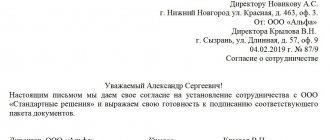People live most of their lives in marriage. During this time, many important events occur in their lives. Sometimes these events relate to the purchase of a particular property. The institution of marriage presupposes that all transactions, and indeed everything important, must be carried out jointly and by mutual consent by spouses. In reality, things happen differently. And then it is worth finding out in advance whether the consent of one of the spouses is needed to purchase real estate when the second has decided to make such a large purchase, and how to draw up the documents so that no excesses are created in the future.
When the consent of the second spouse is necessary
In accordance with paragraph 3 of Art. 35 of the Family Code of the Russian Federation (FC RF ), in order to formalize a transaction with common real estate, the notarized consent of the second spouse is required.
According to the rules, common property includes that which was acquired during the marriage. That is, it was bought. Donated property (even if the recipient is married) remains personal and is not subject to division. Consent is not required for transactions with property acquired before marriage.
Other rules may be established by the prenuptial agreement. For example, in some cases, the agreement specifies that certain property, even purchased during marriage, is considered personal, or - acquired before marriage - joint. All nuances must be formalized by law.
Thus, the consent of the other half is mandatory in the following cases:
- to conclude a transaction for the disposal of property, the rights to which are subject to state registration,
- a transaction for which a mandatory notarial form is established by law.
It turns out that almost any type of disposal of common property, be it:
- exchange;
- donation;
- sale;
- long-term rental.
the consent of the second spouse is required.
Moreover, consent will also be required when purchasing property or its share, or taking out a mortgage. Without the consent of the spouse, such transactions are a waste of the family budget, which can also lead to litigation.
A husband or wife, whose consent has not been obtained, has the right to declare in court a transaction for the alienation of property (be it an apartment, house or car) invalid within 1 year from the moment they learned about its registration.
Spouse's consent to purchase real estate - legal framework
Regarding the consent of the other half to purchase real estate, an ambiguous situation has developed in Russian legislation. In 2013, amendments to legislative acts directly related to the purchase of real estate came into force. Namely, the sphere of registration of contracts for the purchase of real estate. This change introduced some contradictions into the legislative framework regarding the registration of the consent of the husband/wife to purchase real estate.
Here is the legislative framework on which lawyers rely when making transactions in this case:
- Article 35 of the Family Code of the Russian Federation. Based on this legislative act, there is a presumption of the spouse’s consent to any actions related to joint property. And immediately it is prescribed to draw up a written consent of the spouse for transactions with real estate;
- Federal Law 302-FZ of December 30, 2012 (also valid in 2021). In fact, it cancels the official registration of contracts drawn up for the purchase of an apartment, room, residential building, garage, plot of land, etc. After the adoption of the amendments introduced by this law to the Civil Code, the signatures of the parties and a well-drafted agreement are sufficient to conclude a purchase and sale transaction. In this case, the document will have legal force. You will only have to contact government authorities to register ownership.
Knowledgeable lawyers, in the event of controversial issues relating to a given case, skillfully operate with the wording of legislative acts and achieve the desired solution in each individual case.
Purchase/sale of property during marriage
Photo by Pexels
When selling or buying property during marriage, spouses are required to comply with the norms of the Family Code.
It stipulates a mandatory condition for the sale of property: voluntary notarial consent of the second spouse. In the case of a purchase, consent is not required by law, however, the funds spent on the purchase are considered joint property. Thus, a purchase without the consent of the second spouse can be appealed.
The notarized consent of the second spouse is not required if the purchase is made jointly, with the personal presence of the other half and they become co-owners, or if the procedure for purchasing property without the consent of the other half is specified in the marriage contract.
Legislation
Do you need permission from one of the spouses to buy/sell land? First of all, you need to decide what constitutes marital property. According to the Civil Code and the IC of the Russian Federation, all property acquired during marriage (with minor exceptions) is subject to the following rules:
- What was acquired during the period after the marriage was registered in the registry office is considered common property - no matter who is indicated in the Unified State Register as the owner.
- If the spouses have entered into a marriage contract, they must be guided by its rules.
- Property can be divided by agreement, both after divorce and during marriage.
- All disputes can be resolved in court.
Therefore, unless expressly stated in the law or the marriage contract, the consent of the spouse is always required for the sale of common land. But with the purchase, everything is more complicated.
IMPORTANT: The rules described here apply not only to land, but to any real estate.
Gift of property during marriage
Spouses can receive or alienate real estate free of charge by concluding a notarial deed of gift. The specifics of regulation of this type of transaction depend on several factors:
- who is the participant in the transaction;
- whether shares in the property are allocated.
To make it clearer, let's give a few examples.
- The spouse received property as a gift while married. In fact, it is personal property. But, if during the course of family life it was improved, then it is quite possible that the property can be recognized as common in court or by agreement (it is also certified by a notary). In fact, the consent of the other half to a transaction with such property is not required. However, in the future the spouse may challenge the deal, so it’s better to be on the safe side.
- A husband and wife intend to donate property to a third party. If shares in the common property are not allocated and it is in the common ownership regime, then consent to the transaction is necessary. If the shares are allocated, then each spouse has the right to dispose of their share without the consent of the other half.
- The spouse gives property (or shares thereof) to the second spouse. In such a transaction, the consent of the other half is not necessary.
How to obtain your spouse's consent
There are no strict document forms. But it should contain the following main points:
- FULL NAME. agreeing to the deal.
- Characteristics of the transaction: sale, purchase, exchange, donation.
- Address of the property.
- Expression of consent.
- Validity.
- Signature and date.
A sample can be viewed on the Internet.
What you need
To obtain consent, you will need to contact a notary office, since property transfer transactions must be notarized.
You need to collect a package of documents:
- Passport of the person agreeing.
- Marriage agreement (if any).
- Title documents for the apartment.
- Marriage certificate or divorce certificate if the spouses are divorced.
All documents must be presented to the notary in original.
If the consent of the spouse is drawn up when purchasing an apartment with a mortgage, an additional loan agreement and a property pledge agreement are required.
Step-by-step algorithm of actions
To obtain your spouse’s notarized consent for the sale of real estate, do the following:
- Contact a notary office.
- Pay the state fee.
- The document will be prepared by specialists of the notary office.
- Check the document and sign.;
- After certification by a notary, the certificate is given to the spouse.
How much does it cost
You only need to pay the state fee.
Its value is 1500–2500 rubles, depending on the specific notary.
Possible problems and nuances
Problems with obtaining consent usually do not arise if all necessary documents are submitted.
A notary may refuse to serve a client who is under the influence of alcohol or drugs, or who doubts the legal capacity of the person who agrees. In this case, he has the right to request the relevant document from the medical institution.
How is consent obtained?
Consent is a notarized document that is drawn up in the form prescribed by law and certified.
To draw up consent and receive a form, you must contact a notary with a passport and marriage certificate. The price of the service varies from 1,500 to 3,000 rubles, depending on the region. The notary office will ask you:
- passport details of the spouse giving consent;
- description of the real estate - the object of the transaction (you need to take with you documents on ownership);
- description of the essence of the transaction (essence of the transaction, conditions, price, etc.).
The document is drawn up in two copies, it is marked with the date, the signature of the person giving consent and the signature of the notary. One document is given to the spouse, who consents to the transaction, the second remains in the archives of the notary’s office.
Do I need my spouse's consent to purchase?
The acquisition of real estate by married citizens occurs in one of the following ways:
- Both spouses are present during the purchase and sale transaction and both are the buyers of this real estate. After the conclusion of the contract, each of the spouses will own half of the purchased housing. In this case, registration of consent is not required a priori;
- After the conclusion of the contract, the title owner of the property will be only the husband or only the wife. Then the second spouse will need consent to complete the transaction.
True, in accordance with family law, both spouses will still be the owners of the purchased property.
Apartments
Purchasing an apartment is quite an expensive undertaking. Funds for the purchase in most cases are considered spent from the general budget. The family budget includes, among other things, the salary of each spouse. And as a result, spouses are obliged to manage common finances by mutual agreement. Therefore, it is better to register your consent to purchase an apartment at a notary’s office, or complete the transaction in the presence of the other spouse.
To get an apartment using mortgage lending, you will need to fulfill the condition of the second spouse’s consent to purchase the apartment.
The bank providing the loan will definitely request the certified permission of the spouse to purchase real estate, otherwise the mortgage may not be approved.
Dachas
The purchase of a summer house, like other real estate, is a transaction for which the spouse’s permission is theoretically not required, because by default he or she should be aware of events. But in practice, even realtors may ask you for written consent. After all, it will not be beneficial for them if the deal can be canceled in the future.
Garage
A garage also refers to real estate, the purchase of which, in theory, must be negotiated and agreed upon between husband and wife. In fact, of course, various circumstances are possible in which one of the spouses does not want the other to know about his acquisition. If there are no contradictions at the time of the transaction, it is still recommended to obtain the written consent of the spouse to purchase the garage in order to avoid possible complications in the future.
What is the validity period of the consent
The spouse’s consent to the alienation of real estate or its purchase is valid until the completion of the transaction for which it was given. The law does not otherwise limit the validity period of consent, unless otherwise stated in the document itself. In some cases, the validity period of the consent can be stated directly in the text of the consent. For example, give consent for a period of a month, a year, etc.
In addition, various details of consent to the transaction can be entered into the document:
- purchase or sale price;
- description of a specific object of purchase or sale, etc.
- Is it possible to revoke consent?
Cancellation of a spouse's notarial consent is permissible due to the fact that consent is a unilateral transaction and can be canceled or changed. Cancellation or so-called withdrawal of consent must also be done in notarial form.
Notarized consent of the spouse to purchase an apartment
The consent of the husband/wife to purchase an apartment means that the purchase and sale transaction is accepted as acceptable and correct, and also expresses his opinion regarding this operation.
The cost of the notarial consent of the spouse includes the preparation of this document by the notary himself on special paper with security marks and his own seal. The lawyer explains to the second spouse the details of the operation and the points of the document. The person whose consent is necessary to complete the transaction should come to the notary; the other spouse does not have to be there.
Permission to purchase property can be registered with any notary, even geographically not in the place where the purchase of the apartment was made. In this case, the document will have to be sent by mail.
Consent of spouse to purchase real estate sample
How much a notarized consent for the purchase of real estate by one of the spouses costs depends on the region of Russia. The price for this service consists of a notary tariff (approved by law and the same for all notaries - 500 rubles) and prices for legal and technical work, which depend on the location of the notary (on average from 1000 to 2000 rubles).
IMPORTANT: Legally certified consent to purchase real estate from the second spouse has a certain period of validity. Deadlines are usually specified in the document itself. Therefore, it is advisable to register this document on the eve of the purchase and sale transaction.
The exact form of consent is not approved by law, but there are key points that must be present in the document:
- Information about the spouse granting permission. Full name, passport details;
- Information about the spouse making the transaction. Full name, passport details, information from the marriage certificate;
- Information about the property being purchased. You can specify a specific address, limit the location of the purchased object to a specific city, or not limit the purchase options to anything.
The remaining data is entered as needed in individual cases.
Sample of spouse's consent to purchase real estate
The apartment is purchased only for cash (without a mortgage, etc.) - consent is not required
In paragraph 2 of Art. 35 of the RF IC it is written - “When one of the spouses makes a transaction to dispose of the spouses’ common property, it is assumed that he is acting with the consent of the other spouse.” This means that to purchase an apartment, the consent of the spouse is NOT required by default - neither written nor oral. Simply put, according to the Family Code, spouses a priori make decisions together and are aware of the transactions that take place in marriage. Of course, if the spouses have entered into a marriage contract and it says that consent is required, then it needs to be drawn up by a notary.
According to paragraphs 1 and 2 of Art. 34 of the RF IC, any apartment (real estate) purchased during marriage is by default the common property of BOTH spouses. Even if one spouse is indicated in the purchase and sale agreement and in other documents, the second spouse will still become one of the owners, although not according to the documents, but according to the law.
Show a recent example from practice Spouses Artem and Marina finally saved up money to buy a one-room apartment and chose an option for themselves. They decided to register the apartment only in Artyom’s name, i.e. in the purchase and sale agreement there will be only one buyer. When the contract and documents were submitted to the MFC, the employee did not require consent from his wife, although they knew that Artem was married (he saw the stamp in the passport). Deal has been completed successfully. Although Artem is the sole owner of the apartment, it is considered the property of both spouses, the main thing is that it was purchased during marriage. In case of divorce, the apartment will be divided equally.
Other articles
Documents for purchasing an apartment on the secondary market - a complete and up-to-date list How to safely transfer money to the seller when buying an apartment - the main payment methods have been discussed
A good question was asked to me in the comments - what about clause 3 of Art. 35 IC RF? After all, it says: “In order for one of the spouses to enter into a transaction to dispose of property, the rights to which are subject to state registration, a transaction for which a mandatory notarial form is established by law, or a transaction subject to mandatory state registration, it is necessary to obtain the notarized consent of the other spouse.” Let's take it in order.
First, I want to explain about “property disposal transactions.” When a spouse buys an apartment, he does not manage this apartment (it doesn’t exist yet), but manages the money to buy this apartment. Disposal of money does not require state registration. Therefore, in order to manage money for real estate purchases, the consent of the spouse is not required. When one spouse sells an apartment, that is, disposes of it, consent is required.
Next, we will look at the following words - “transactions for which the law establishes a mandatory notarial form.” A mandatory notarial form of the transaction is required only when alienating (i.e. selling) the real estate of a minor - clause 2 of Art. 54 of the Federal Law on Real Estate Registration. Or rent - art. 584 Civil Code of the Russian Federation. Nothing is written about the mandatory notary form when purchasing real estate, so consent is not required.
Now about the “transaction subject to mandatory state registration.” In paragraph 1 of Art. 154 of the Civil Code of the Russian Federation says: “Transactions can be bilateral or multilateral (agreements) and unilateral.” Clause 1 Art. 549 of the Civil Code of the Russian Federation states: “Under a contract for the purchase and sale of real estate (a contract for the sale of real estate), the seller undertakes to transfer ....” Therefore, a real estate sale agreement = transaction. Since October 1, 2013, sales contracts themselves are not registered - changes have been made to clause 8 of Art. 2 of the Federal Law of December 30, 2012 N 302-FZ. From this date, only the transfer of ownership from the seller to the buyer under the contract is subject to mandatory registration - clause 1 of Art. 551 Civil Code of the Russian Federation. And since the agreement/transaction is not subject to registration, consent to purchase is not required.
What if the spouse does not know about the purchase or does not consent?
If the spouse does not know about the purchase of the apartment or does not consent to it, then in the future he can challenge the purchase and sale transaction in court. After all, according to paragraph 2 of Art. 35 of the RF IC, money (income) earned during marriage is the common property of both spouses. This means that the spouses must manage this income (in our case, spend it on buying an apartment) together, having come to mutual agreement in advance. Therefore, the deceived spouse will have a great chance of winning the case, especially with a competent lawyer.
Consents, including: spouses and travel of minors
Home / Consents, including: spouses and travel of minors
CONSENT OF SPOUSES TO CONCLUSION OF TRANSACTIONS
In order for one of the spouses to enter into a transaction for the disposal of property, the rights to which are subject to state registration, a transaction for which a mandatory notarial form is established by law, or a transaction subject to mandatory state registration, it is necessary to obtain the notarized consent of the other spouse. The spouse, whose notarized consent to carry out the said transaction was not received, has the right to demand that the transaction be declared invalid in court within a year from the day when he learned or should have learned about the completion of this transaction. The list of transactions subject to notarization is defined in the Civil Code of the Russian Federation. Notarization of transactions is also possible in cases provided for by agreement of the parties, although by law a notarial form is not required for transactions of this type.
Analysis of paragraph 3 of Art. 35 of the IC shows that transactions “for the disposal of real estate” and transactions “requiring notarization and (or) registration in the manner prescribed by law” must also include transactions aimed at acquiring real estate ownership. Thus, if spouses, using common funds acquired during marriage, purchase a residential house, apartment, garage, land plot or other real estate and draw up a purchase and sale agreement, then the consent of the other spouse must be certified by a notary. This requirement of the law is explained by the fact that both those (transactions for the acquisition of real estate) and other transactions (for its alienation) from the point of view of consequences are important for the family as a whole, therefore, to complete them, a clearly expressed and notarized consent of both spouses is required . This position of the legislator is quite logical and understandable. By purchasing real estate, spouses manage income, which is also common joint property. To certify consent, it is necessary to provide information about the type of transaction, as well as the name and location of the real estate in respect of which consent is given. In the consent, the spouse can stipulate the conditions for the other spouse to complete the transaction.
To certify the spouse’s consent to enter into a transaction, you must have the following documents:
- document proving the identity of a citizen on the territory of the Russian Federation;
- original marriage certificate.
Sign up
CONSENT TO THE TRAVEL OF MINOR CHILDREN ABROAD AND IN RUSSIA
In accordance with Article 20 of the Federal Law of August 15, 1996 N 114-FZ “On the procedure for leaving the Russian Federation and entering the Russian Federation,” a minor citizen of the Russian Federation, as a rule, leaves the Russian Federation together with at least one of his parents, adoptive parents, guardians or trustees. If a minor citizen of the Russian Federation leaves the Russian Federation unaccompanied, he must have with him, in addition to his passport, a notarized consent of his legal representatives to leave.
Thus, this law provides for the departure of a minor, accompanied by a legal representative or independently. The law does not provide for the accompaniment of minors by third parties, with the exception of the departure of minors as part of an organized group of minors. However, it is absolutely clear that minors (children under 14 years of age), and sometimes older children, are not able to travel abroad on their own. Therefore, the question arises of verifying consent for the departure of a minor accompanied by another person. Art. 20 Federal Law No. 114-FZ does not provide for such a case. Nevertheless, it can be certified, and, as practice shows, it is precisely such consents that are most often certified. The consent must indicate the date of departure and the state(s) to which the minor is traveling.
To certify consent, you must have the following documents:
- document proving the identity of a citizen on the territory of the Russian Federation;
- documents confirming the powers of legal representatives: for parents
- a child’s birth certificate, a certificate of paternity;
for adoptive parents
- a birth certificate or a certificate of adoption;
guardian, trustee
- an act of the guardianship and trusteeship authority on the appointment of a guardian/trustee.
Sign up
Rates
| № p/p | Name of notarial act | Rate | Fees for legal and technical services | Note |
| 1 | 2 | 3 | 4 | 5 |
| 34 | Consent of the spouse to conclude a transaction (disposal of the joint property of the spouses) | 500 rub. | 1 200 | If more than one real estate item is indicated in the document, the fee for UPTH increases by 100 rubles. for each subsequent item of the transaction, but in total cannot amount to more than 2,100 rub. |
| 36 | Certification of consent of legal representatives and trustees for the departure of a minor citizen of the Russian Federation abroad of the Russian Federation. | 100 rub. | 1 100 | The size of the fee for UPTC does not depend on the number of minors, as well as persons giving consent, and on the number of accompanying persons |






